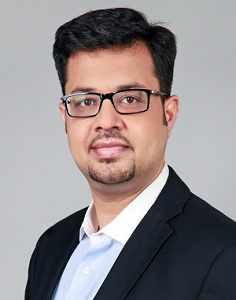Post-Pandemic, the expectations in the healthcare industry have taken a complete shift. Expectations from the patients, caregivers, authorities, regulators, etc. too have transformed in the current age. We have witnessed major changes when it comes to in-person care or virtual care. Delivering retail-like experience for patients, home care, gathering insights via connected health data from different touch points like wearables, apps, EMR for better analysis/diagnosis are of paramount importance.
With the growing expectations, Healthcare providers do need better tools to manage the discrete and isolated systems. When we discuss delivering a seamless experience, it is not just focused on the patients but also about how the front-liners till the last liners are enabled with a well-connected platform. The real satisfaction is seen in emergency situations where the patients need not repeat their medical history to the caregivers. We, at Intertec, have been working very closely with authorities, hospitals, laboratories in the Middle East to migrate them to the digital services platforms which include the connected Patient experience solution.
I would like to bring out a unique case study where we have helped one of our health care customers in Saudi achieve excellence in Patient Services. It is a very large high-class facility ranked as one of the top hospitals. They aim to automate the patient experience with output-driven transformation.
In the whole process of patient experience transformation, we have integrated various data touchpoints like EMR, call center, portals, mobile apps, social media into one single view. Our experience platform focuses more on the Patient relationship data while the EMR / EHR focuses more on the patient medical data. Merging them together helps to manage the relationship, give personalized experience, and ensure effective interactions between patients and caregivers.
Our patient experience solution helped the hospital manage their patient profiling, registrations, appointments, reminder call-outs, medication reminders, ambulatory services, ministry services, etc. very efficiently and effectively. The transformation journey cannot be completed without automating the entire back-office operations including the revenue integration with finance, supply chain including the demand planning & forecasting, managing the vaccine schedules and availability, human resources including manpower planning, caregivers scheduling, payroll, self-service, etc.
Post-implementation, the CXO team at the hospital could very clearly see the transformation of the organization and the productivity increase in the team. Now the front office and backend teams work towards service excellence rather than wasting time searching for the data. Some interesting facts which we could bring out from the implementation are:
- Centralized data availability to the front office teams have increased the response time by 10X and the wait time on-call was reduced from 3 mins before implementation to less than a min post-implementation
- Missed appointments have come down by 40% compared to last year which supported their growth
- Satisfaction surveys have brought out factual data which helped them to focus on the recovery plan
- Reporting to the Ministry of Health on the Ambulatory services, satisfaction levels, etc. has been fully automated. This has saved almost 3 – 4 employee’s efforts in a month from the team.
The above are a few measurable benefits apart from increasing the bottom line and patient retention.
The journey is not over yet; we are in the process of building family relationship data within the platform which would help the caregivers get more insights while diagnosing the patient and prevent genetic diseases. This would help in gaining patient confidence & retention.
On the other hand, the regulators/authorities are also moving towards digital services compared to the pre-pandemic era. Our experience with few authorities/regulators in the Middle East shows that digitization is the need of the hour. We have a few use cases where we have moved authorities from a semi-automated platform to fully automated platforms to help them manage the license issuance, drug registrations, automating internal and external digital services for caregivers as well as citizens.
So, data would play a major role in the future in the health care industry. Countries have started to look at how to bring the patient data into a single platform and made it available to the hospitals, clinics, insurance providers, regulators, and authorities. End of the day, patients own their data.
To conclude, the seamless patient experience, Artificial Intelligence helping caregivers in diagnosing, Machine Learning in understanding the pattern, and virtual care would change the way the healthcare providers operate today.
About the Author:
 Sekhar Ramarao heads Microsoft practice at Intertec Systems. He is a Microsoft Business Applications Enthusiast and evangelist with over 20+ years of experience in building solutions. A key-note speaker, blogger, articulator, and storyteller.
Sekhar Ramarao heads Microsoft practice at Intertec Systems. He is a Microsoft Business Applications Enthusiast and evangelist with over 20+ years of experience in building solutions. A key-note speaker, blogger, articulator, and storyteller.
Sekhar has helped a lot of healthcare and other large organizations digitally transform themselves with some of the leading industry solutions and cutting-edge technologies.


















